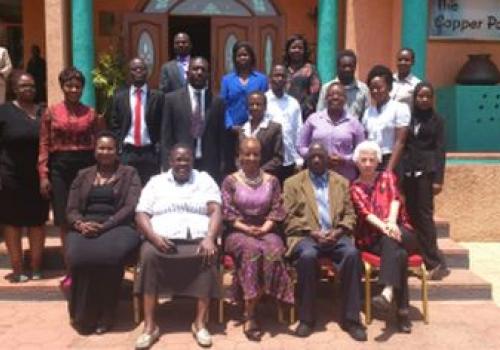The Malawi Gender Mainstreaming Training and Policy Harmonization workshop was held from 6-10 October 2014 in Lilongwe. The training was conducted at a time when Malawi had just finalised the review of its National Gender Policy which is about to be validated by stakeholders before it is formally submitted to the Office of the President and Cabinet (OPC). This was therefore an opportune time for the country to harmonise the policy priority areas with the provisions of the SADC Protocol on Gender and Development.
The main objectives of the training workshop were to:
- Harmonise the National Gender Policy to the SADC Protocol on Gender and Development and enhance the participants’ knowledge and understanding of the SADC Protocol on Gender and Development and other gender instruments at regional and international levels
- “Strengthen participants” understanding of the key gender planning concepts and frameworks in the context of Malawi
- Strengthen participants’ skills and knowledge of gender budgeting and gender mainstreaming and to further develop cost estimates of the activities for the relevant sections of the Action Plan of the National Gender Policy in reference to the SADC Protocol on Gender and Development.
The SADC Protocol on Gender and Development is an instrument that guides the region in the integration of gender into its development agenda and this is ensured through a process of aligning the National Gender Policies of the SADC Member States to the provisions in the protocol and by developing Costed National Gender Action Plans of the National Gender Policies for a specific time period.
Experiences of other Member States that have done the harmonization process, indicate that there are benefits of stakeholder consensus building around collaboration and systems strengthening for sustainability where emphasis has been put on capacity building at different levels across sectors. The process of harmonization starts with a capacity building exercise using the SADC Gender Mainstreaming Tool Kit which is designed to facilitate the development of gender mainstreaming capacity and gender responsive budgeting at technical and policy levels; and facilitate the integration of gender in all SADC policies, projects and activities at both Secretariat and Member States, to ensure that the working environment is gender responsive and guarantees equal opportunities and treatment to both women and men.
The training was attended by key government personnel from line Ministries and stakeholders from development partners and Civil Society Organisations. A total of 38 participants attended the workshop and these included 23 women and 15 men.The workshop was a success as all expected outcomes were met. It was also very interactive in the sense that several methodologies were used in delivering the training which included a mixture of presentations, case studies, exercises, group works and plenary sessions. So far Mozambique, Namibia, Seychelles and Zambia have completed the process of harmonizing their National Gender Policies and Costed Action Plans to the SADC Protocol on Gender and Development.

